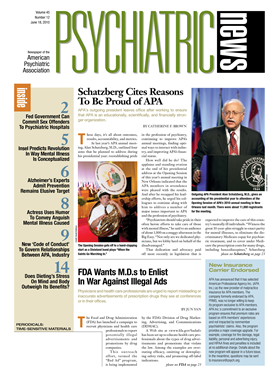APA's Board of Trustees has approved a set of principles and standards to govern the Association's relationships with all outside organizations, including pharmaceutical and medical-device companies, that seeks to minimize the potential for conflicts of interest.
These principles and standards, referred to as a code of conduct, were proposed by the Work Group on Future Relationships With Industry, which was appointed in 2009 by APA president Alan Schatzberg, M.D., and approved unanimously by the Board of Trustees on April 26.
The code of conduct specifies critical criteria by which all potential organizational relationships must abide: The relationship must aid APA's mission, foster APA's goals, and obey all laws and regulatory rules. In addition, APA will maintain full control of its name as well as any products it develops.
Sidney Weissman, M.D., a professor of clinical psychiatry at Northwestern University School of Medicine in Chicago and a former member of the Board of Trustees, chaired the work group.
Whether APA should have or maintain relationships with industry was a fundamental question the work group members discussed extensively, according to Weissman. Their answer was yes.
Weissman acknowledged that this stance may be unpalatable for some psychiatrists who feel that APA should sever all ties with pharmaceutical or device companies. “However, we do not believe [such an approach] is feasible,” he noted. Weissman said the work group concluded that relationships with the industry that researches, develops, and markets the treatments psychiatrists prescribe every day are “inevitable.”
At the work group's recommendation, incoming APA President Carol Bernstein, M.D., will appoint a Conflict of Interest Committee of the Board to implement the code of conduct in the form of specific policies and procedures and review APA relationships with outside organizations to ensure that they comply with the new guidelines.
Further, the code of conduct incorporates special guidelines for selecting APA practice guideline committees. It states that a practice guideline committee “be directly funded solely by APA or one of its subsidiaries,” and the chair of a practice guideline committee will not have any financial or professional relationships that could be perceived as affecting decision-making capacity. Individuals with financial or other ties to industry can serve on practice guideline committees with the approval of the committee chair or the Conflict of Interest Committee.
This code of conduct has formalized “the way APA is doing business every day,” Paul Burke, executive director of the American Psychiatric Foundation and the committee's staff liaison, told Psychiatric News. Although these guidelines do not change APA's operational philosophy, making them official will ensure that all future relationships will continue to follow these principles.
In July 2009, the Board of Trustees approved a policy for disclosure of interests and affiliations for APA members and participants in APA activities, including elected officials of the Association. The policy stresses “maximum transparency” and requires individuals to disclose all forms of involvement related to psychiatry, financial as well as uncompensated, regardless of whether the involvement is perceived as a conflict of interest or not.
“The entire field of medicine is moving toward greater transparency in its relationships to industry, and APA has been at the forefront of the trend,” APA Medical Director James H. Scully Jr., M.D., said in a written statement.
In addition to Weissman, members of the work group were Jack Barchas, M.D., Mary Helen Davis, M.D., Richard Harding, M.D., John Hayes, M.D., Bruce Hershfield, M.D., and Dilip Jeste, M.D.
“The work group members included psychiatrists in private practice, academia, and industry,” Weissman pointed out in an interview with Psychiatric News. “This diverse group represents people engaged in all areas of American psychiatry.”
The Web address for APA's code of conduct for relationships with outside organizations will be announced in a future issue. 
